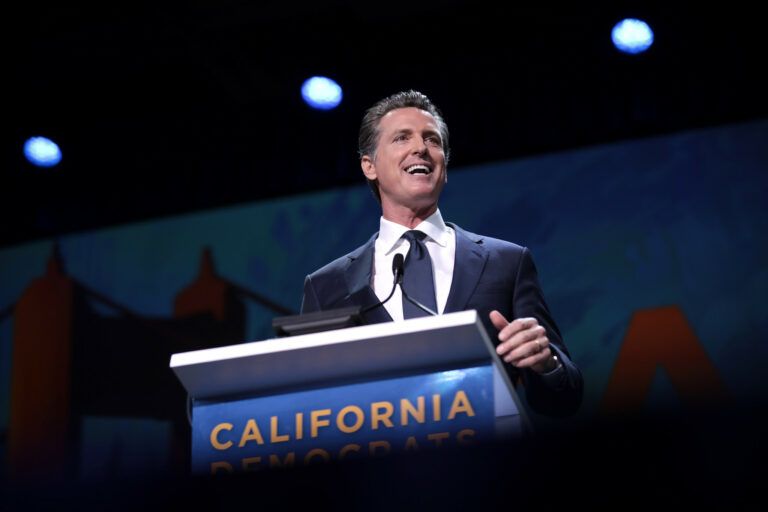Originally published in The Diplomat on October 23, 2023
As Gavin Newsom, the governor of the U.S. state of California, heads to China to discuss climate change with President Xi Jinping, he will face two daunting challenges: how to persuade Xi to speed up the transition from fossil fuels to renewable energy, and how to address systematic human rights abuses by the Chinese government that are also a major barrier to progress on climate change.
The Chinese government’s track record in embracing renewable energy is impressive. It has invested heavily in and expanded the use of hydro, solar, and wind power, meeting ambitious targets ahead of schedule. China leads the world in the production of batteries for electric vehicles, while the United States and other developed economies lag far behind.
Yet China is the world’s biggest greenhouse gas emitter. Its emissions continue to increase at an alarming rate, with the government saying they will peak only by 2030. China uses more coal – the dirtiest of fossil fuels – than any other country. In late August, the Center for Research on Energy and Clean Air (CREA) described China’s new construction, permitting, and resumption of mothballed coal power plants as a “spree.” Worryingly, CREA said there is “no effective enforcement of the policies limiting new project permitting.”
Beijing’s commitment to coal isn’t just a domestic matter. In 2021, Xi told the United Nations General Assembly that his government would end its backing of coal-fired power abroad. Yet recent research suggests China has suspended support to only about half of these plants. And just last month China publicly announced that it would oppose the phase out of coal at this year’s U.N. climate conference, even though this is one of the chief goals of many countries at grave risk from climate change.
Making matters worse, the Chinese government is supporting coal use through international financial institutions that are supposed to be supporting a transition to green energy. Just this week Inclusive Development International reported that the relatively obscure Postal Savings Bank of China is “by far the largest financier of coal developers in the [International Finance Corporation’s] portfolio.” Chinese development banks continue to lead globally in financing coal power around the world, as the top ten “arrangers of bonds for coal-related projects globally are… all based in China.”
Fortunately, Newsom has the credibility to press Xi on climate change. California has long led the way on policies and innovation to address climate change. The state has already reached approximately 60 percent renewable energy in its power grid and has committed to net zero emissions by 2045 (China has only committed to this in 2060, far too late to meet global goals).
Yet a just and sustainable transition to net zero is not just about reducing the use of fossil fuels. It also requires respect for basic human rights, such as free speech, peaceful protest, participation in public affairs, and the right to a healthy environment.
None of this exists in Xi Jinping’s China. Rather than establish legal protections that would strengthen the fight against climate change, the government is targeting activists while protecting bad corporate actors. After unprecedented floods hit Beijing and Hebei province in August, online criticism of authorities’ responses was swiftly censored. Even youth activists who have promoted Greta Thunberg-style “Fridays for Future” protests have been targeted.
Research into China’s solar industry has revealed disturbing links to Uyghur forced labor all the way from mining quartz through to producing panels. Some of the largest hydropower plants – including the largest and highest in the world – are in Tibetan areas, where the free, prior, and informed consent standard required by international law for large-scale relocations is ignored by local authorities.
To speed up the transition and overcome powerful corporate interests, public pressure is essential. This can only happen if basic rights are protected which, Chinese activists say, will require consistent international pressure.
Newsom is taking this trip in part to rebuild extremely frayed ties between the United States and China and encourage joint action on climate change. But as an inexperienced interlocutor with China, he shouldn’t, as his officials have suggested, make the mistake of shying away from “sensitive” subjects. Those of us who have long worked on human rights in China know that while Chinese officials don’t like being challenged over their human rights record, they expect visiting American officials to raise both individual cases and systemic issues.
If Newson sends the message that he is willing to sacrifice rights protections for discussions on climate change, Chinese officials will decide he can be manipulated. This would set a dangerous precedent that would not only harm courageous Chinese activists but haunt a putative Newsom presidential campaign and administration. Silence on human rights in China should not be an option.
Instead, Newsom should understand that defending the rights of climate activists and communities opposing coal plants goes hand in hand with achieving his climate goals with China. In this way Newsom will be doing his part to make sure Xi Jinping’s climate commitments are more than just hot air.
Photo Credit: Gavin Newsom. Photo by: Gage Skidmore via Flickr (CC2.0)







